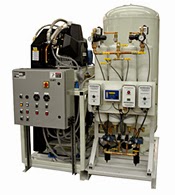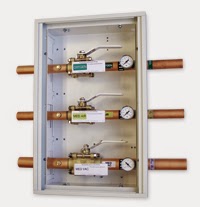
If you are a hospital, lab, outpatient surgery center, dental lab or other healthcare facility in need of medical air and gas solutions in North Carolina or Virginia, there are several questions you should ask when evaluating a service provider. Below are our top 8 FAQs to be aware of during the process.
Can you use Medical Air as Climate Control air?
Medical air sources shall be connected to the medical air distribution only and used for air in the application of human respiration and calibration for medical devices for respiratory application. NFPA 99-2012.
Is an Oil-Free screw compressor accepted for Medical Air?
Yes. Rotating element compressors provided with a compression chamber free of oil can be allowed. NFPA 99-2012.
What is the required dew point of Medical Air dryers?
Maximum dew point is below the frost point of 32 degrees F at 50 to 55 PSI and any level of demand. NFPA 99-2012.
What about my Intake for Medical Air, can I put it anywhere?
No, it needs to be a clean air source, 25 feet from ventilating systems, vents and other exhausts. It also needs to be a minimum of 20 feet above the ground and 10 feet from any door, window or other opening into the building. NFPA 99-2012.
Can we put the exhaust for the Medical Vacuum anywhere in the basement or in a corridor?
No, it has to be outdoors, at least 10ft from any window, door, air intake or other opening into the building. It also needs to be at a different level from other air intakes where prevailing winds or topography could not divert the exhaust into occupied areas. NFPA 99-2012.

What is WAGD?
Waste Anesthetic Gas Disposal. WAGD systems provide the proper evacuation of potentially hazardous waste anesthetic gases during the administration of anesthesia to patients.
Does everyone that installs Medical Air and Vacuum need ASSE 6010 certification?
Yes, this is the Professional Standard for Medical Gas installers.
What is the new ASSE 6040 qualification?
This standard applies to persons maintaining, testing and inspecting medical air and vacuum systems. Training and certification can be accomplished through the Healthcare facility by which such persons are employed to work with specific equipment or Credentialing for Professional Qualification Standard for Medical Gas Maintenance Personal. NFPA 99-2012
Visit our site for more on medical gas solutions in Virginia and North Carolina.


